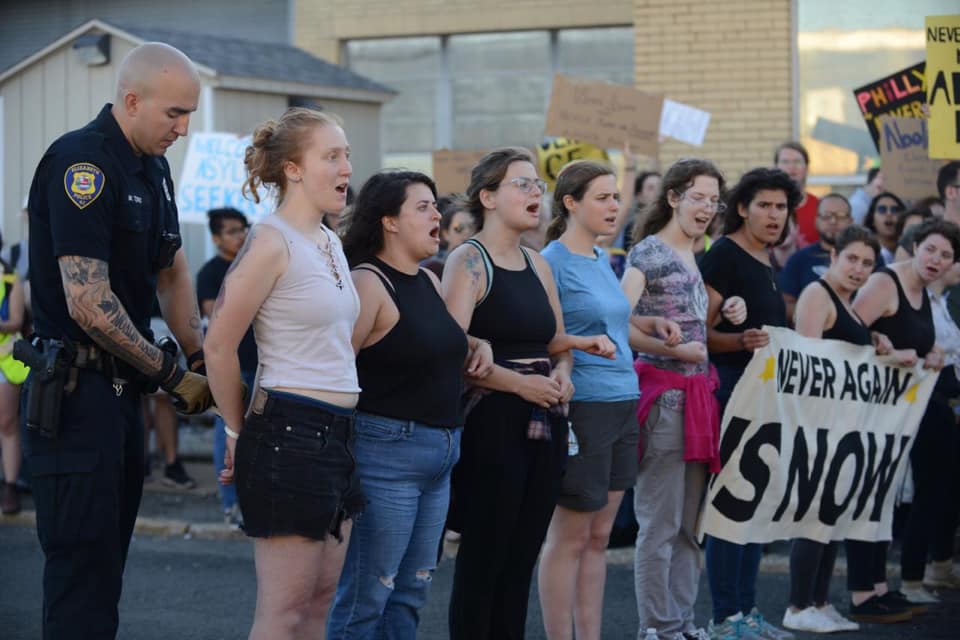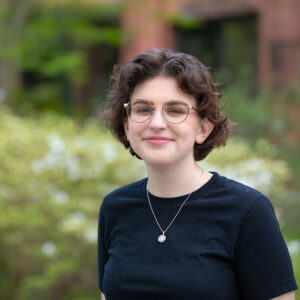When 36 Jews, including myself, were arrested protesting ICE in Elizabeth, New Jersey last Sunday, the Elizabeth police seemed not to know what to do with us. They zip-tied my hands so tight they began to go numb, while some of my friends’ handcuffs were loose enough to slip out of the second the police turned away. We had to wait while more and more vans were brought in to bring us to police headquarters; our numbers threatened to max out their capacity.
We were freed after a few hours, and as I journeyed back to my aunt’s house in Brooklyn for the night before court the next morning, I watched videos of our arrests go viral on Twitter and Facebook. Now, I find myself at the end of this 4th of July long weekend with nothing to celebrate. I went to jail for only a few hours – an incredibly lenient fate, no doubt related to the white privilege most of us arrested carry.
The day after my arrest, a dear friend of mine texted me. “Will you please help me deal with my friend?” she asked. She followed with Facebook messenger screenshots. Her friend – let’s call him Billy, for the sake of his anonymity – was a Christian, like her. And after she had posted something on Facebook related to my arrest, he had chosen to message her: not about ICE camps, or about the racist nature of the U.S. immigration system – but about how he, on behalf of the Jews, took offense at the term ‘concentration camps.’
He told my friend about a Holocaust survivor who called for Alexandria Ocasio-Cortez to be removed over her use of the term. “What do you think about that?” he asked.
“A lot of Jews have also stood by the comments,” my friend replied, “including people with relatives who survived the Holocaust. Reasonable people can disagree, and Jews aren’t a monolith.” Billy responded by telling her that to him, that sounded like the ‘I have a Black friend’ defense, and when she brought me -her actual Jewish friend who had actually been arrested – into the conversation, he immediately began questioning my Jewishness.
The conversation became about whether I, Sophie Hurwitz, was in fact a real, practicing Jew or, as Billy put it, simply a leftist using my Jewish parentage to my advantage. Billy didn’t want to ask why the United States was detaining people indefinitely solely based on their method of entry into this country and where they came from. Instead, he wanted to ask me for my Jew card. I suppose in some way I am writing this as a way of proving the Jewishness of my actions to him, though I know I have no obligation whatsoever to do so.
I believe that semantic arguments in our current climate are not only useless, but actively harmful. Billy was asking whether we can use our strongest terms for atrocities when they happen to non-white, non-citizen people. By using the terms of the Holocaust for migrant internment camps and ICE raids in the mainstream discourse, we are not saying anything particularly radical. We are simply saying that these horrors are just as horrific now as they were when they happened to the Jews of Europe.
In Elizabeth, New Jersey, when I shouted “Close the camps!” and sang “Which Side Are You On,” a song I remembered from the Ferguson rebellion in my hometown of St. Louis when I was young, I meant it. In choosing to argue over semantics rather than taking action to stop this cruelty – by whatever name you wish to use for it – Billy has chosen his side. He has chosen apathy, and the side of the oppressor.
I know which side I’m on, too – and it certainly isn’t his. Whenever I can, I believe it is my duty to spend my time working to make my communities healthier and safer. As Tae Phoenix, a Latina Jewish activist arrested with me in Elizabeth, pointed out, our communities are not separate. Therefore, it is morally necessary that all of us stand up for those who are currently being caged by this government, and fight for a world in which those cages are simply a cautionary tale, something we look at with sorrow and with gratitude that it didn’t get any farther than it has now. I am on the side of hope for a world without cages.
As the 36 of us were sitting in a hotel conference room, looking at maps of the Elizabeth detention center and planning to take a stand, one person’s voice suddenly rose above the rest. “This is the most Jewish thing I’ve done in a really long time,” he said. In watching this movement spread across the country, in watching my people put our bodies on the line and work as accomplices in the fight for immigrant justice, I, too, have never felt more Jewish.
Sophie Hurwitz is a student at Wellesley College majoring in history and working as news editor at the Wellesley News in her spare time. She was born and raised in St. Louis, Missouri. Sophie is a 2019 New Voices Fellow at the Jewish Women’s Archive.

